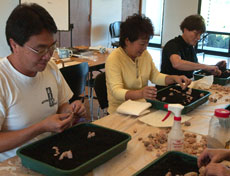Garden Workshop spreads Japanese culture

(From left) Aaron Ebata and Sue Cramer of Urbana and Peggy Balbach of Champaign work on model Japanese gardens Saturday at the Japan House. Peter Hoffman
October 3, 2005
Recently, the Japan House is expanding its core mission to spread the Japanese culture by offering a Garden Workshop series designed to cultivate in participants an appreciation for an important aspect of Japanese culture – gardening.
The Garden Workshop series took place on three consecutive Saturdays beginning on September 17, with the fourth and final workshop scheduled for October 8. Each workshop lasts for six hours, and during the workshops, participants looked at slides, visited gardens, developed garden plans and constructed a mini model of a Japanese garden.
Jim Bier, the Garden Workshop leader, described its goals.
“There are a number of people who are interested in Japanese gardens, and I’m going to give them a chance to learn the basics,” Bier said. “I’ve seen close to 150 major gardens in Japan, and I’ve studied those, so I’m passing on the information to people now.”
The first workshop included a short lecture followed by slides of Japanese gardens.
Get The Daily Illini in your inbox!
“We went through hundreds of slides the first day seeing how Japanese gardens are put together,” said Tim Potts, a participant in the workshop and Bloomington resident. “Mr. Bier is very intelligent and he covers a lot of ground very well. We covered concepts pretty strongly and (saw) the history of Japan expressed through gardens and things leading to what you would want to put in your garden.”
The workshop required a minimum fee of $140 dollars, which included the expenses of the materials used for the garden models.
“My favorite thing about this workshop is that we get hands-on experience,” said Alice Vernon, another participant. “It’s not all lectures. We got to go out and see (Bier’s) garden and his work in the gardens around Japan House. We get to experiment with it before we go out there with the real stuff. I think it’s a Japanese method to play with soil and use little rocks (with models) like this before doing it actually.”
Several of the participants felt they did not only receive their money’s worth of materials and hands-on experience, but they also left each day with more knowledge.
“I was an organic gardener, and I’ve been looking for ways to use space better which Japanese gardens use very efficiently,” Potts said. “I learned that less is more, about unpainted wood versus painted wood, and the more you take away leaves what’s left as stronger.”
According to Potts, the exposure to another culture provided him with a broader outlook on nature and Japanese culture.
“(The garden workshops) increased the appreciation of what we see and enjoy what we have around us,” Potts said. “And that result is very humbling to study Japanese culture because they do these things so well.”
With the idea of promoting and understanding the underlying theme of peace, the Japan House is putting in more effort to spread its culture in the community.
“I think Japan House is (putting forth) a lot of contributions to this community by showing the different culture and getting others involved by having open houses,” said Sue Cramer, a participant. “They always have ways for Americans to get involved with workshops and other classes. They also have a tour to Japan every other year, so it’s a nice cultural exchange.”
Although the Japan House offers a variety of classes, workshops such as the gardening workshop series have paved ways for new options in the future.
“They were very interesting and helpful,” Cramer said. “As far as Japanese gardening and landscaping, maybe they could have a class on how to maintain the gardens. I want this class to continue. They have a lot of classes here, but I think they’re not that well advertised. They should have it better advertised-they’re excellent classes.”






